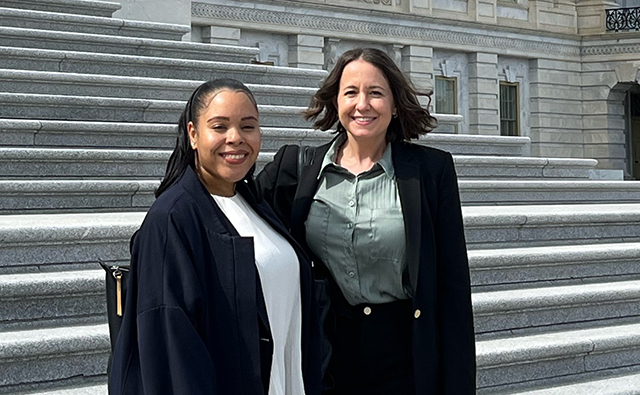CAL Faculty go to Washington, D.C. to Advocate for Humanities at NHA Meeting

The National Humanities Alliance (NHA) is a coalition of organizations that advocates for funding and support for the humanities in the United States. Each year, the NHA holds an annual meeting to discuss current issues and trends in the field of humanities and to strategize about ways to advocate for the humanities at the national level. The NHA Annual Meeting took place in Washington D.C. this March. With support from the College of Arts and Letters Dean’s Office, Kishauna Soljour and Kristal Bivona attended the meeting and participated in Humanities Advocacy Day activities on Capitol Hill.
During the NHA meeting, we learned about the state of the humanities in the country and the overwhelming trend toward introducing legislation at the state level that threatens the academic freedom of students and faculty in both K-12 and higher education. The keynote, “Engaging Divisive Concepts Legislation at the Local and State Level,” focused on preparing humanities advocates for fielding questions about the role of the humanities in a polarized political atmosphere and how to best manage interactions with lawmakers and staff who might be dismissive about its importance to the nation.
We were disheartened to learn that 43 states are considering bills that aim to control how instructors and students discuss racism, sexism, and issues of systemic inequality in class. Additionally several states have proposed bills that would facilitate the banning of books from school libraries and curricula while others are considering legislation that is hostile towards transgender students. The speakers, Frederick Lawrence, Jessie Brown, Janel George, and Trinidad González, offered practical advice on how advocates could get involved in efforts to oppose legislation.
The topics of breakout sessions during the NHA meeting ranged from how to advocate for humanities funding to expanding access and bolstering inclusion in the humanities. We were given information about the concrete requests we would be making on Capitol Hill regarding funding for the National Endowment for the Humanities, Fulbright-Hayes, the National Archives, and Title VI, which funds world language education and area studies.
We also learned about strategies for promoting the humanities and pursuing funding for our projects at our universities. By attending these sessions, we were able to get a more in-depth understanding of more specific topics within humanities advocacy.
Finally we met with our state delegations. The California delegation included faculty, administration, and government liaisons from UC San Diego, UC Riverside, UC Irvine, San José State University, and San Diego State University.
Throughout the day, we visited the offices of Senator Alex Padilla, Senator Diane Feinstein, Representative Sara Jacobs and Representative Scott Peters. The highlight of these meetings was acknowledging the hard work of faculty and the high impact of federal humanities funding at SDSU.
The NHA prepared one-sheets on each lawmaker with whom we had meetings so we could see a summary of their past support for the humanities and their track records for signing “Dear Colleague” letters to fund the programs for which we were advocating. By the end of the day, we had acquired a new understanding of the urgency of our advocacy work and were prepared to go to the Hill to meet with lawmakers.
